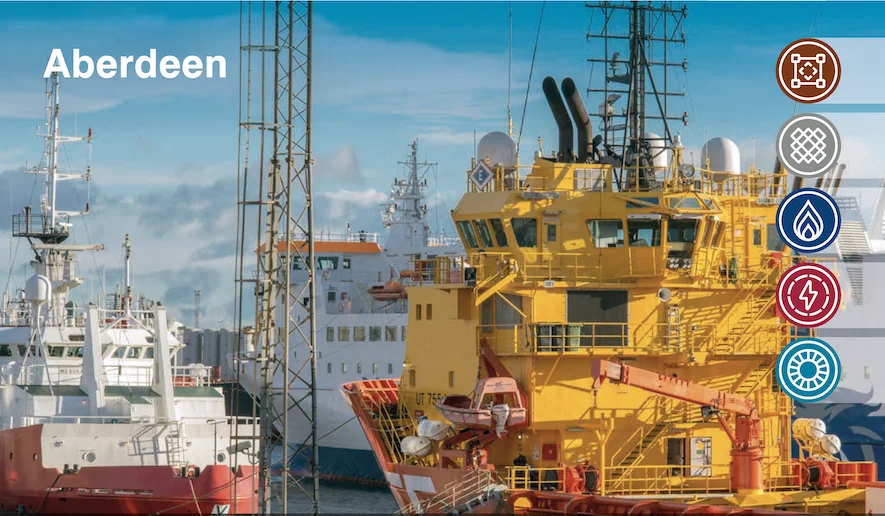Orion’s RPO Model: The Strategic Next Step Beyond MSP
13 Aug, 20257 Mins
Organisations today face a more complex talent landscape than ever before. Skills shortages, rapidly shifting market conditions, and increasing demands from both clients and candidates mean that recruitment is no longer just about filling vacancies. It is about building a sustainable, agile, and future-ready workforce.
For companies that have already experienced the benefits of a Managed Service Programme (MSP), the next logical step in their talent journey often lies in Recruitment Process Outsourcing (RPO). Where MSP provides visibility, control and efficiency over contingent workforce management, RPO takes talent acquisition to the next level by embedding strategic recruitment capability directly into your business.
In this blog we answer key questions about MSP and RPO, including:
• What is the difference between RPO vs MSP in recruitment?
• When should an organisation move from an MSP to RPO?
• What can be outsourced under an RPO business model?
• How does Orion’s approach deliver measurable long-term value?
We’ll also look at the role technology plays in making RPO a success.
What Is RPO in Recruitment and How It Differs From an MSP
Recruitment Process Outsourcing (RPO) is the most integrated form of recruitment outsourcing available. It goes far beyond an external agency providing ad-hoc hiring support and it isn’t just a temporary “spike” solution for seasonal or project needs.
Instead, an RPO business model embeds a dedicated recruitment function inside your organisation, managed by a specialist provider such as Orion. It covers the full recruitment lifecycle — workforce planning, job design, sourcing, screening, onboarding and ongoing performance monitoring — creating a seamless link between hiring managers and the talent market.
Unlike a Managed Service Provider (MSP) recruitment model, which primarily focuses on contingent or temporary workforce management, an RPO delivers a fully integrated approach to permanent hiring. Many RPO providers operate under your brand, using your systems and aligning fully with your culture and processes so that candidates experience a consistent journey.
Key outcomes of a well-run RPO include:
- Improved quality of hire and faster time-to-fill for permanent roles
- Reduced cost-per-hire through economies of scale compared with using multiple agencies
- Stronger alignment between recruitment and business objectives
- Better candidate experience through a single point of contact and consistent process
By combining the control and compliance benefits of an MSP with the strategic reach of an RPO, organisations gain a unified talent solution that supports both contingent and permanent hiring.
When should an organisation move from an MSP to RPO?
For organisations running a successful Managed Service Provider (MSP) recruitment model, the transition to Recruitment Process Outsourcing (RPO) is often a natural evolution. An MSP gives you visibility over contingent labour and ensures compliance, cost control and access to the right talent at the right time.
However, an MSP typically focuses on non-permanent staff. When permanent hiring remains decentralised, inconsistent or reliant on multiple agencies, the business may face inefficiencies, duplication and a lack of strategic oversight.
Signs you may be ready for RPO include:
- High permanent headcount growth – especially in fast-scaling industries such as energy, life sciences, or technology.
- Fragmented recruitment processes across departments or regions, leading to inconsistent candidate experiences and variable quality.
- Difficulty attracting niche or scarce skills in competitive markets.
- Rising recruitment costs due to heavy reliance on multiple agencies and lack of economies of scale.
- The need for workforce planning that aligns long-term hiring with business strategy.
For organisations that already rely on Orion’s MSP for contingent workforce management, adding RPO can create a truly unified talent strategy that spans both temporary and permanent hires.
FAQs about moving from an MSP to RPO
What is the main difference between an MSP and an RPO?
An MSP manages your contingent or temporary workforce and supplier base, while an RPO embeds a permanent recruitment function within your business to handle the full recruitment lifecycle.
When is the right time to switch from an MSP to RPO?
The right time is when permanent hiring volumes rise, processes become fragmented or costly, and you need a single, strategic approach to both temporary and permanent recruitment.
Can an organisation run an MSP and an RPO at the same time?
Yes. Many businesses, especially in sectors like energy, life sciences and engineering, run both models together. Orion can design a combined MSP and RPO solution to give full talent lifecycle control.
What can be outsourced under an RPO business model?
An RPO business model isn’t one-size-fits-all. The scope can be fully tailored to your organisation’s needs. Some employers begin with project RPO for specific functions or locations, while others implement enterprise RPO to cover all permanent hiring. Because Orion also delivers Managed Service Provider (MSP) recruitment solutions, we can design an RPO that complements your existing MSP or builds a combined model.
Key recruitment activities that can be outsourced include:
- Onboarding – Coordinating the new hire process, ensuring compliance and providing a smooth start for employees (background checks, document verification, pre-start engagement)
- Job design and workforce planning – Defining roles clearly, identifying skill gaps and anticipating future hiring needs with hiring managers
- Market benchmarking – Using data to assess salary ranges, benefits and skill availability to ensure competitive positioning
- Sourcing and talent pipelining – Building pools of pre-qualified candidates for high-demand roles, reducing time-to-hire
- Assessment and selection – Designing and delivering interview frameworks, psychometric testing and technical assessments
- Employer branding – Enhancing your company’s profile in the market and ensuring your EVP resonates with target talent segments
- Reporting and analytics – Providing real-time dashboards and insights to track performance and identify opportunities for improvement
Outsourcing these elements frees up internal teams to focus on strategic priorities while ensuring that best practice is applied consistently across the organisation.
Benefits: standardisation, stakeholder clarity, long-term agility
A well-implemented RPO delivers far more than operational relief. Its real value lies in the transformation of recruitment into a unified, strategic function, that supports business growth.
1. Standardisation
Without a centralised approach, recruitment processes can vary widely between departments or regions, leading to inefficiencies, compliance risks, and inconsistent candidate experiences. RPO introduces consistent processes, policies, and performance standards, ensuring that every hire meets the same high-quality benchmark.
2. Stakeholder clarity
An RPO creates clear ownership of recruitment activity. Hiring managers know exactly who to contact, what to expect, and how timelines will be managed. Candidates have a single, consistent point of contact, which improves communication and reduces drop-off rates.
3. Long-term agility
The modern business environment demands flexibility. An RPO partner can scale resources up or down based on demand, adapt to changing market conditions, and rapidly deploy expertise for new projects or markets. This agility is particularly valuable for companies operating in volatile sectors or entering new geographies.
4. Cost optimisation
By consolidating recruitment under one provider, organisations benefit from economies of scale, reduced agency spend, and more efficient use of advertising budgets. Improved quality of hire also reduces long-term costs associated with turnover and underperformance.
5. Better decision-making
With standardised data collection and analytics, leadership gains a clear view of talent trends, hiring bottlenecks, and workforce readiness. This insight informs everything from skills development programmes to future workforce planning.
How technology drives success in an RPO business model
Although Recruitment Process Outsourcing (RPO) is primarily about people and processes, technology is now critical to making it work. Modern recruitment platforms integrate applicant tracking, candidate relationship management, assessment tools and analytics into a single ecosystem that supports both permanent and contingent hiring.
Key ways Orion’s RPO model uses technology to improve results in sectors like oil & gas, life sciences, engineering, energy and pharma:
- Automating repetitive tasks – CV screening, interview scheduling and compliance checks are handled automatically, freeing recruiters to focus on high-value interactions.
- Enhancing candidate experience – mobile-friendly applications, timely updates and personalised communication improve engagement across permanent and contractor talent pools.
- Real-time visibility for hiring managers – dashboards track progress against agreed service levels, making it easy to manage recruitment activity across multiple business units or geographies.
- Data-driven diversity and inclusion – unbiased screening tools and analytics help reduce bias and improve talent outcomes in competitive sectors.
- Predictive workforce planning – analytics forecast hiring needs, highlight attrition risks and inform long-term planning, especially valuable for high-volume or niche skills in energy, engineering and life sciences.
FAQs about technology in RPO vs MSP
Does an RPO replace the technology used by an MSP?
No. An RPO builds on existing systems and can integrate with the technology used for your MSP to create one view of both contingent and permanent hiring.
Why is technology so important in RPO?
Because it provides data, automation and candidate experience at scale — essential for managing permanent hiring across multiple locations and sectors.
Can Orion’s RPO model be customised for my industry?
Yes. Orion tailors its RPO technology stack to each client, whether you’re in oil & gas, life sciences, engineering or pharma.
How does Orion deliver an RPO business model alongside MSP?
At Orion, Recruitment Process Outsourcing (RPO) is more than outsourced recruitment activity — it’s a strategic partnership designed to deliver lasting value. Our RPO business model is built on three core principles:
- Integration – We work as an extension of your own team, adopting your culture, processes and values while applying our expertise and best practice across industries such as oil & gas, life sciences, engineering, energy and pharma.
- Flexibility – Every RPO solution is tailored to your needs, whether that’s a short-term project RPO, a full enterprise RPO or a combined RPO and Managed Service Provider (MSP) solution for full talent lifecycle control.
- Results – We measure success on outcomes that matter: time-to-fill, quality of hire, candidate satisfaction, cost reduction and continuous improvement throughout the partnership.
Because Orion also delivers MSP recruitment solutions, we’re uniquely positioned to help clients transition from contingent workforce management to permanent hiring under one unified model. We understand the synergies between MSP and RPO and can design a phased approach that minimises disruption and maximises impact.
FAQs about Orion’s RPO approach
Can Orion manage both MSP and RPO at the same time?
Yes. We specialise in combined MSP and RPO solutions so you get complete control of contingent and permanent hiring.
How is Orion’s RPO different from other providers?
We integrate with your systems and brand, bring sector-specific expertise, and focus on measurable outcomes rather than just filling roles.
Can the model be scaled as our business grows?
Absolutely. Our flexible approach allows you to start with project RPO or MSP and scale to a full enterprise solution across multiple regions or functions.
A strategic step towards full talent lifecycle control
Moving from MSP to RPO is not just a change in recruitment delivery, it is a step towards complete visibility and control over your organisation’s talent strategy. It enables businesses to shift from reactive hiring to proactive workforce planning, ensuring that the right skills are in place to deliver on future growth plans.
In a market where talent can make or break a company’s success, having an integrated, data-driven, and agile recruitment function, is no longer a competitive advantage; it is a necessity.
With Orion as your RPO partner, you gain more than operational efficiency. You gain a strategic ally committed to building a workforce that is ready for whatever the future holds.
Ready to take your talent strategy from reactive to future-ready? Discover how Orion’s RPO model can transform your recruitment operations today.



